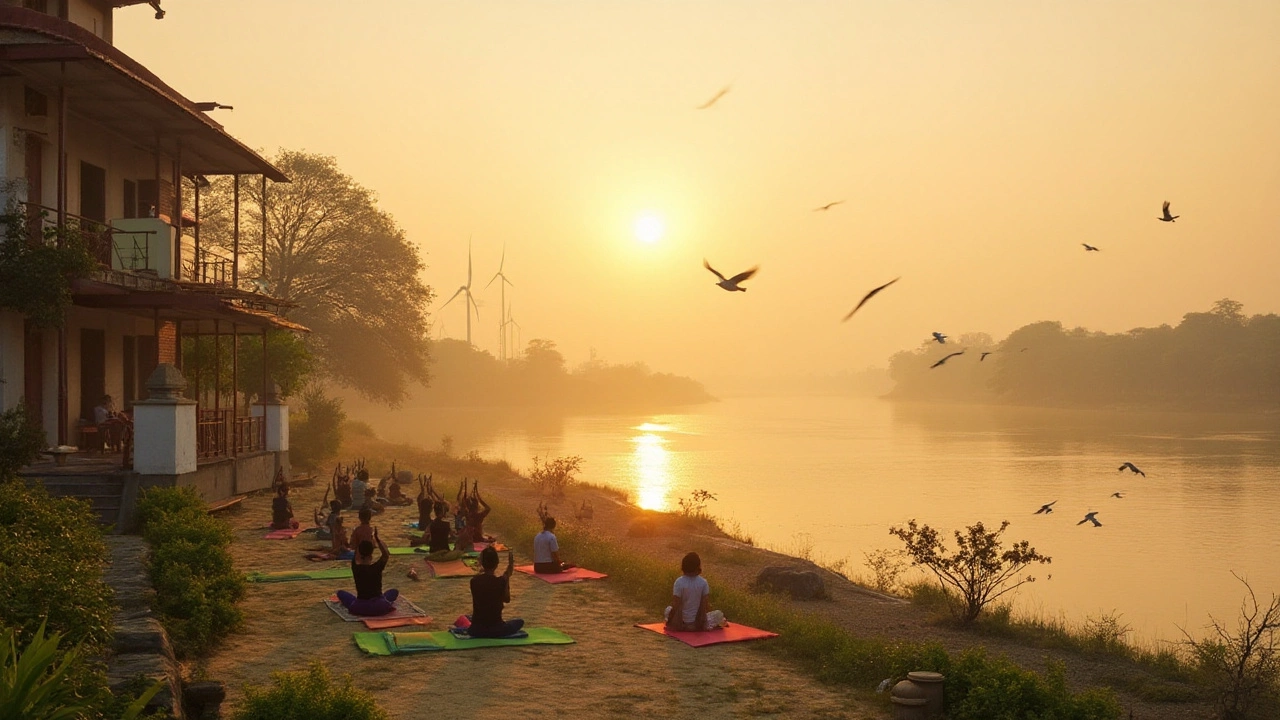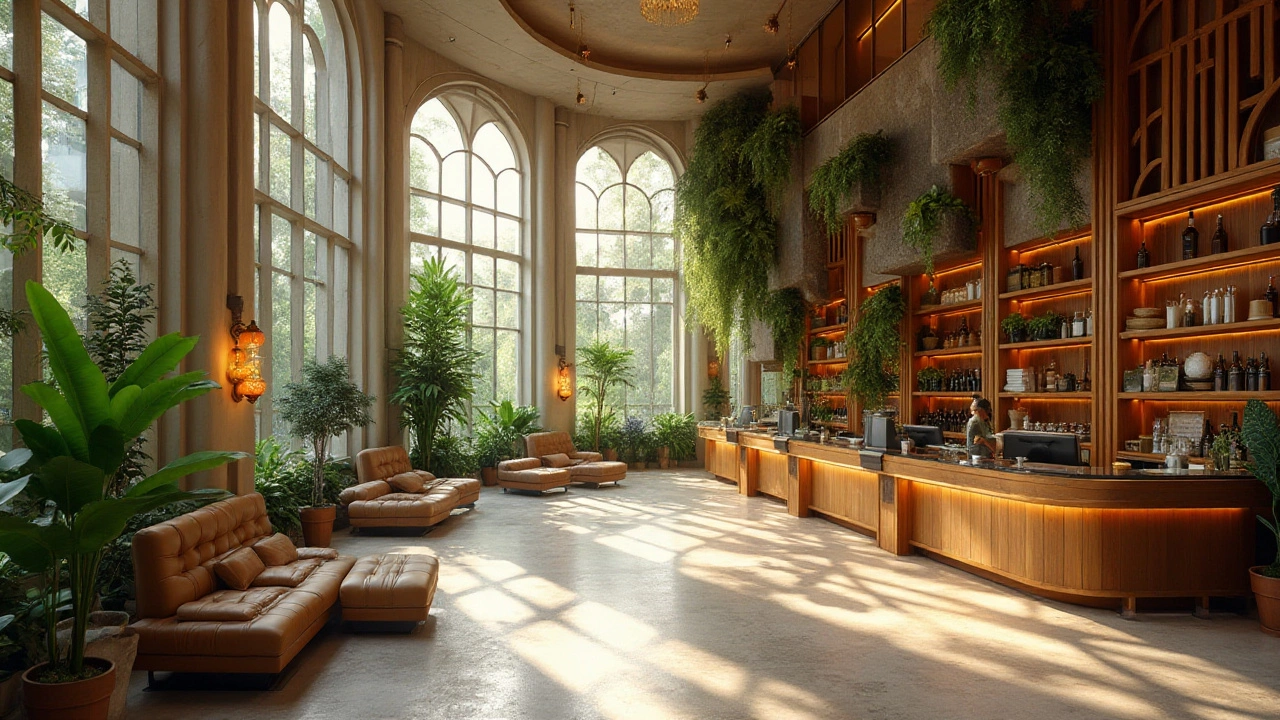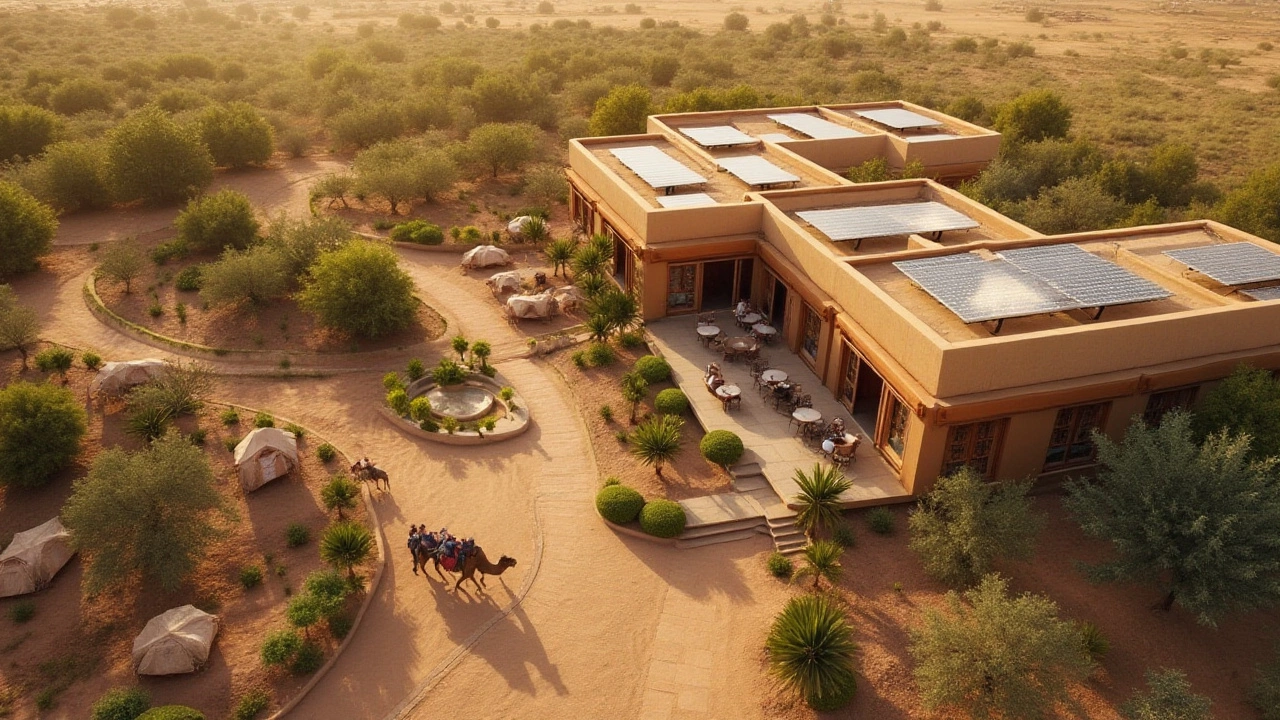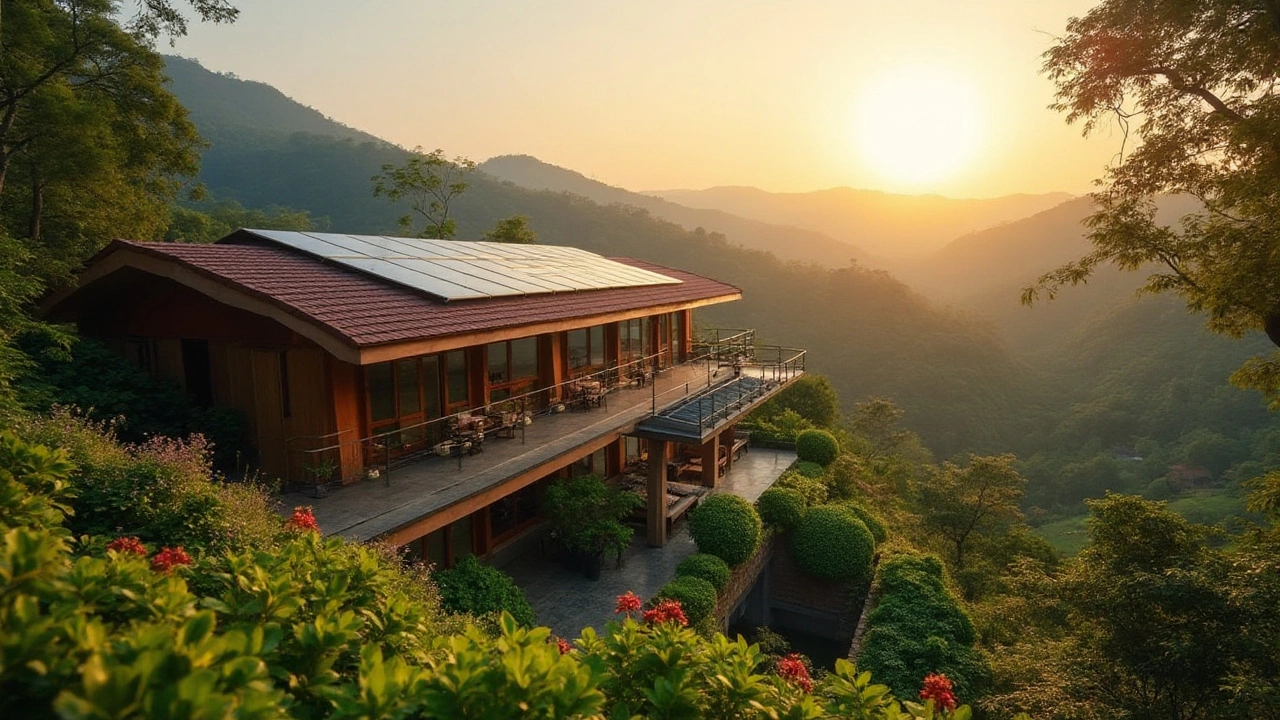Imagine a sanctuary where the crisp smell of native flora greets you as the sun peeks over verdant hills, all powered by the gentle hum of sustainable energy. Creating an eco-friendly hotel or resort is no longer just a trend; it's a pivotal movement that speaks to the harmonious coexistence of comfort and environmental stewardship. By integrating nature into every layer of design, from architecture to daily operations, hotels can offer guests an escape that also respects the planet.
The journey of constructing such a retreat begins with the right foundations. Builders and designers need to consider not only the visual appeal and functionality of their creations but also their impact on local ecosystems. This approach includes choosing sustainable materials, harnessing renewable resources, and adopting a forward-thinking attitude towards energy efficiency and waste reduction.
- Foundations of Eco-Friendly Design
- Sustainable Energy and Water Use
- Waste Reduction and Local Sourcing
- Guest Experience and Education
Foundations of Eco-Friendly Design
Embarking on a journey to create an eco-friendly hotel or resort requires starting with a clear and conscientious blueprint. At the heart of this endeavor is the concept of sustainable architecture, a practice that looks beyond aesthetics to prioritize both function and environmental harmony. The foundation of any eco-friendly property should be a seamless blend of modern comfort and natural elements. Designers often turn to innovative, sustainable materials like reclaimed wood, bamboo, and recycled steel to reduce the carbon footprint of construction. Moreover, the strategic placement of buildings to maximize natural light and minimize artificial heating and cooling demands can result in significant energy savings.
The role of architecture isn’t limited to what materials are used or how structures are placed. It's about creating an atmosphere where guests feel at one with nature. Open designs that invite the outdoors in contribute to a resort’s charm while simultaneously cutting down on energy use. A growing trend among sustainable resorts is the use of living walls and green roofs, which not only enhance aesthetic appeal but also improve air quality and provide natural insulation. These innovations show that with the right strategies, luxury and sustainability can go hand in hand. Indeed, words from the acclaimed architect and environmentalist William McDonough remind us that "design is the first signal of human intention." A thoughtful design can enhance both the guest experience and the planet’s health.
Green tourism is supported by sites that harness renewable energy sources like solar, wind, or geothermal power. With advances in technology, integrating such solutions is becoming increasingly viable.
- Solar panels
- Wind turbines
- Geothermal pumps
Lastly, when developing an eco-friendly hotel, it's essential to engage with and respect the local community and environment. Incorporating local materials, respecting local wildlife habitats, and ensuring that water, waste, and other resources are managed sustainably are key to building a sustainable resort. Community engagement enriches the design process, offering insights that may incorporate native plants in landscaping or inspiration from local architecture traditions. These efforts not only foster community ties but also enrich the guests' experience, immersing them in the authentic ethos of their destination, drifting away from cookie-cutter designs toward a personalized, place-based aesthetic that resonates with the soul and speaks volumes about stewardship.

Sustainable Energy and Water Use
In the quest for truly eco-friendly hospitality, efficient management of energy and water resources is paramount. Modern technologies open doors to sustainable practices that not only preserve precious resources but also enhance guest experiences. One effective strategy is to harness renewable energy sources, such as solar and wind power. A resort situated in a sunny locale could easily install photovoltaic panels, converting sunlight into electricity, significantly reducing reliance on fossil fuels. Likewise, coastal properties may consider wind turbines, capturing the natural breeze to generate clean energy. By seamlessly integrating these systems, hotels both lower operational costs and contribute to a more sustainable world.
Beyond energy, water conservation is a critical component. Hotels can deploy innovative solutions to curtail water wastage. Low-flow showerheads and dual-flush toilets are just the beginning. Implementing greywater recycling systems allows treated wastewater from baths and sinks to be reused for landscaping or flushing, minimizing fresh water consumption. Another consideration is rainwater harvesting. This practice collects rainfall in reservoirs, which can then be used for non-potable purposes, reducing dependency on municipal water supplies. The pursuit of water efficiency doesn't stop at technology; staff training and guest awareness programs can encourage responsible water use across the board.
"The integration of renewable energy solutions in hotel design is not just about sustainability. It’s about future-proofing the industry against rising energy costs and climate change impacts." — Dr. Elizabeth Collins, Environmental Sustainability Expert
Lighting presents another area ripe for sustainable action. LED lighting, for example, uses up to 75% less energy than traditional incandescent bulbs and lasts up to 25 times longer. This simple switch can profoundly impact a hotel's carbon footprint. Automating light usage with sensors in low-traffic areas ensures that energy isn't wasted on illuminating empty spaces. Furthermore, such smart systems can be controlled remotely through apps, providing managers with real-time insights into energy usage patterns and opportunities for optimization.
To truly revolutionize energy use, hotels might explore geothermal heat pumps, particularly in regions conducive to tapping into the earth's natural thermal energy. These systems offer an efficient way to heat and cool buildings and swimming pools while significantly slashing greenhouse gas emissions. It's also beneficial to analyze heating, ventilation, and air conditioning (HVAC) systems regularly. Maintenance is key, as an inefficient HVAC system can lead to unnecessary energy expenditure. For those venturing into these practices, it's crucial to not only install the technologies but also to maintain them diligently to maximize their benefits.
For properties that invest in sustainable solutions, communicating their efforts clearly to guests enhances their brand’s reputation. Information kiosks in common areas or interactive in-room tablets can display live data on energy savings and water consumption, engaging guests in the hotel's environmental journey. Educating them on the impact of choosing an eco-conscious stay fosters a sense of participation, often leaving travelers more inclined to adopt sustainable habits in their own lives. These efforts ultimately transform sustainable practices from behind-the-scenes operations into compelling narratives that resonate with eco-aware travelers.

Waste Reduction and Local Sourcing
Waste reduction is at the heart of any truly eco-friendly operation. An important step involves examining daily operations and identifying areas where resource usage can be trimmed. For instance, when it comes to food services, hotels can significantly lower waste by adopting practices such as composting scraps and implementing portion control methods. The hospitality sector has witnessed successful examples of these practices, with notable chains reducing food waste by over 30%. In addition, rethinking guest amenities can contribute immensely to waste reduction; replacing single-use toiletries with dispensers and eliminating plastic water bottles in favor of water refill stations not only cuts down on waste but also engages guests in the sustainability conversation.
Local sourcing serves as a complementary strategy, amplifying sustainability efforts while supporting community economies. By sourcing materials and food locally, hotels can reduce the carbon footprint associated with transporting goods over long distances. This approach also enhances the guest experience by offering authentic flavors and crafts indicative of local culture. Notably, a study by Cornell University found that 70% of travelers prefer destinations that emphasize local experiences. More than just a marketing opportunity, hotels that prioritize local procurement can create symbiotic relationships with nearby suppliers, ensuring fresh produce and goods while fostering community growth.
Engaging Local Communities
Incorporating the community into the hotel's sustainability narrative is crucial. Developing local partnerships doesn’t just mean purchasing locally; it also involves involving community members in decision making, thus tailoring the hotel's offerings to reflect regional heritage and environmental needs. This collaborative approach can boost a host's reputation and create authentic experiences for guests. For example, a resort could organize guided tours led by locals, focusing on indigenous wildlife and cultural history, enriching both the guest's stay and providing economic benefits to the area. By making these connections, eco-friendly resorts can turn sustainability into a shared goal among travelers and the local community.
"A commitment to reducing waste and supporting local economies not only aids in preserving the environment but strengthens the social fabric of the community," says Dr. Ellen Hahn, a recognized expert in sustainable tourism.
Hotels implementing waste reduction and local sourcing strategies can track progress and share successes publicly to educate guests on their impact. Many modern travelers prioritize social and environmental consciousness in their travels, and openly communicating efforts can enhance guest loyalty. Providing transparent updates through in-room information, social media, and newsletters invites guests to take pride in the green steps taken during their stay, fostering a collaborative green commitment extending beyond the resort experience.

Guest Experience and Education
The modern traveler seeks more than just a comfortable bed; they desire an enriching experience that connects them to the surrounding culture and environment. At the core of creating such engagement lies the fusion of sustainability with education, ensuring that guests leave with not only memories but also a deeper understanding of the ecological footprint of travel. Eco-friendly hotels and resorts have a unique opportunity to imbue their guests with this appreciation by offering immersive experiences that highlight the beauty and fragility of nature.
Through guided nature walks led by local experts, guests can explore local habitats, learning about the indigenous plants and animals that inhabit the area. Such outings not only foster a sense of connection to the world around them but also emphasize the importance of environmental preservation. Furthermore, hands-on workshops in sustainable practices like organic farming or renewable energy usage can provide tangible skills and insights. These interactive sessions can be an eye-opener, demonstrating how simple, conscious living contributes positively to global health.
The World Tourism Organization states, "Tourism that takes full account of its current and future economic, social, and environmental impacts is vital, addressing the needs of visitors, the industry, the environment, and host communities."
Many eco-friendly resorts may choose to incorporate informative displays throughout their rooms and communal areas. These displays can share fascinating facts and stories about the local ecosystem, the resort's sustainable efforts, and ways guests can contribute positively during their stay. Providing in-room guides with green tips, such as conserving water usage and participating in recycling programs, empowers guests to make eco-conscious decisions easily.
The digital age offers another avenue for engaging visitors. Implementing apps or QR codes around the resort, where guests can access educational materials or videos about sustainability initiatives, enables them to engage at their own pace. By doing so, resorts tap into the growing trend of infotainment - education delivered in an engaging manner - and help solidify the guest’s commitment to eco-friendly practices.
Partnering with local communities to offer cultural exchanges or volunteer opportunities for guests can significantly enhance the travel experience. When guests participate in these programs, they gain a broader perspective of the social and cultural dimensions of sustainability, establishing a profound sense of respect for local traditions and practices. These partnerships can also offer tourism a sustainable pathway by ensuring that financial benefits are shared with the communities hosting visitors.
Ultimately, the goal is to ensure that every moment a guest spends at an eco-friendly hotel or resort is enriched with experiences that educate and inspire. By embedding sustainability education seamlessly into the fabric of the guest experience, these establishments can help build a future generation of conscious travelers who value and advocate for a healthier planet.
